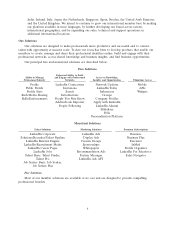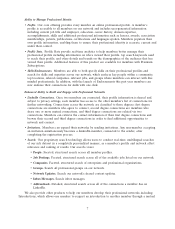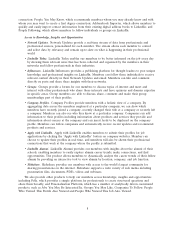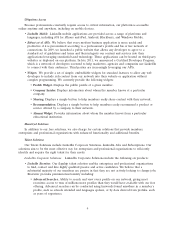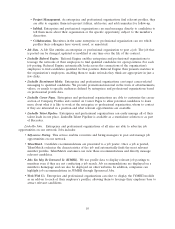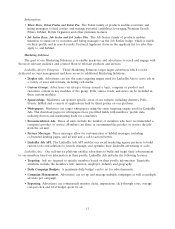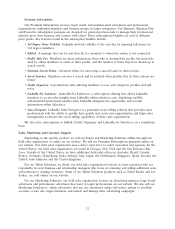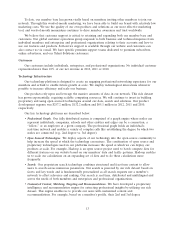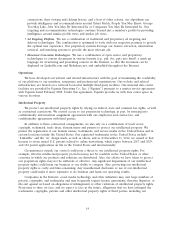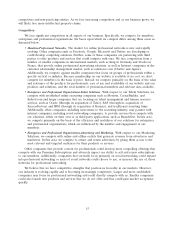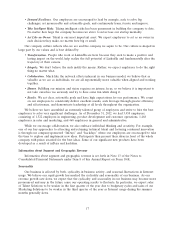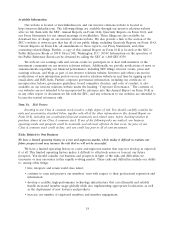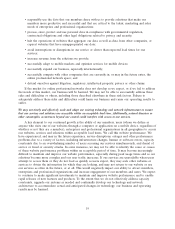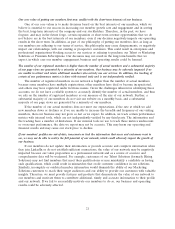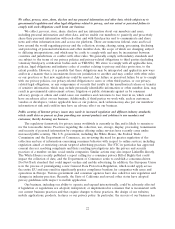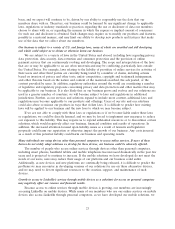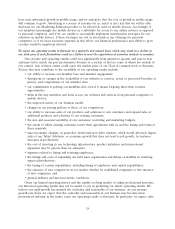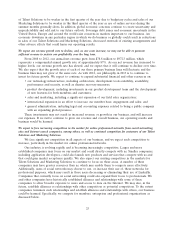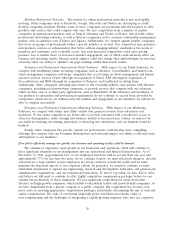LinkedIn 2012 Annual Report Download - page 18
Download and view the complete annual report
Please find page 18 of the 2012 LinkedIn annual report below. You can navigate through the pages in the report by either clicking on the pages listed below, or by using the keyword search tool below to find specific information within the annual report.Government Regulation
We are subject to a number of foreign and domestic laws and regulations that affect companies
conducting business online, many of which are still evolving and could be interpreted in ways that could
harm our business. In the United States and abroad, laws relating to the liability of providers of online
services for activities of their users and other third parties are currently being tested by a number of
claims, including actions based on invasion of privacy and other torts, unfair competition, copyright and
trademark infringement, and other theories based on the nature and content of the materials searched,
the ads posted, or the content provided by users. Any court ruling or other governmental action that
imposes liability on providers of online services for the activities of their users and other third parties
could harm our business. In addition, rising concern about the use of social networking technologies for
illegal conduct, such as the unauthorized dissemination of national security information, money laundering
or supporting terrorist activities may in the future produce legislation or other governmental action that
could require changes to our products or services, restrict or impose additional costs upon the conduct of
our business or cause users to abandon material aspects of our service.
In the area of information security and data protection, most states have passed laws requiring
notification to users when there is a security breach for personal data, such as the 2002 amendment to
California’s Information Practices Act, or requiring the adoption of minimum information security
standards that are often vaguely defined and difficult to practically implement. The costs of compliance
with these laws may increase in the future as a result of changes in interpretation. Furthermore, any
failure on our part to comply with these laws may subject us to significant liabilities.
We are also subject to federal, state, and foreign laws regarding privacy and protection of member
data. We post on our website our privacy policy and user agreement, which describe our practices
concerning the use, transmission and disclosure of member data. Any failure by us to comply with our
posted privacy policy or privacy related laws and regulations could result in proceedings against us by
governmental authorities or others, which could harm our business. In addition, the interpretation of
privacy and data protection laws, and their application to the Internet is unclear, evolving and in a state of
flux. There is a risk that these laws may be interpreted and applied in conflicting ways from state to state,
country to country, or region to region, and in a manner that is not consistent with our current data
protection practices, or that new regulations will be enacted. Complying with these varying domestic and
international requirements could cause us to incur additional costs and change our business practices.
Further, any failure by us to adequately protect our members’ privacy and data could result in a loss of
member confidence in our services and ultimately in a loss of members and customers, which could
adversely affect our business.
In addition, because our services are accessible worldwide, certain foreign jurisdictions have claimed
and others may claim that we are required to comply with their laws, including in jurisdictions where we
have no local entity, employees, or infrastructure.
Our Values and Company Culture
Our values and unique company culture serve as the foundation to our success. Our values are the
principles by which we manage our day-to-day business and facilitate decision-making. Our core values
are:
•Our Members Come First. We encourage employees to know and understand our members and to
ensure that we foster the long-term vitality of the LinkedIn ecosystem.
•Relationships Matter. By fostering trust with colleagues and partners, we all succeed. We
fundamentally believe that doing what is right is more important than being right.
•Be Open, Honest and Constructive. We expect our employees to communicate with clarity and
provide feedback with consistency in a constructive way.
16


